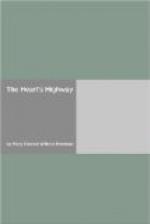I used to slink away as soon as possible when my mother turned her startled blue eyes upon me in such wise, that she might regain her peace, and sometimes I used to send my brother John to her on some errand, if I could manage it, knowing that he could soon drive me from her mind. One learns early such little tricks with women; they are such tender things, and it stirs one’s heart to impatience to see them troubled. However, I will not deny that I may have been at times disturbed with some bitterness and jealousy at the sight of my brother and my stepfather having that which I naturally craved, for the heart of a little lad is a hungry thing for love, and has pangs of nature which will not be stilled, though they are to be borne like all else of pain on earth. But after I saw Mary Cavendish all that passed, for I got, through loving so entirely, such knowledge of love in others that I saw that the excuse of love, for its weaknesses and its own crimes even, is such as to pass understanding. Looking at my mother caressing my brother instead of myself, I entered so fully into her own spirit of tenderness that I no longer rebelled nor wondered. The knowledge of the weakness of one’s own heart goes far to set one at rights with all others.
When I first saw Mary Cavendish she was, as I said before, a little baby maid of two and I a loutish lad of fourteen, and I was going through the park of Cavendish Hall, which lay next ours, one morning in May, when all the hedges were white and pink, and the blue was full of wings and songs. Cavendish Hall had been vacant, save for a caretaker, that many a day. Francis Cavendish, the owner, had been for years in India, but he had lately died, and now the younger brother, Geoffry, Mary’s father, had come home from America to take possession of the estate, and he brought with him his daughter Catherine by a former marriage, a maid a year older than I; his second wife, a delicate lady scarce more than a girl, and his little daughter Mary.
And they had left to come thither two fine estates in Virginia—namely these two: Laurel Creek, which was Mary’s mother’s in her own right, and Drake Hill; and the second wife had come with some misgiving and attended by a whole troop of black slaves, which made all our country fall agog at once with awe and ridicule and admiration. I was myself full of interest in this unwonted folk, and prone to linger about the park for a sight, and maybe a chance word with them, having ever from a child had a desire to look farther into that which has been hitherto unknown, whether it be in books or in the world at large. My lessons had been learned that morning, as was easily done, for I was accounted quick in learning, though no more so than others, did they put themselves to it with the same wish to have it over. My tutor also was not one to linger unduly at the task of teaching, since he was given to rambling about by himself with a book under one arm and a fish-pole over shoulder; a scholar of gentle, melancholy moving through the world, with such frequent pauses of abstraction that I used often to wonder if he rightfully knew himself whither he was bound.




